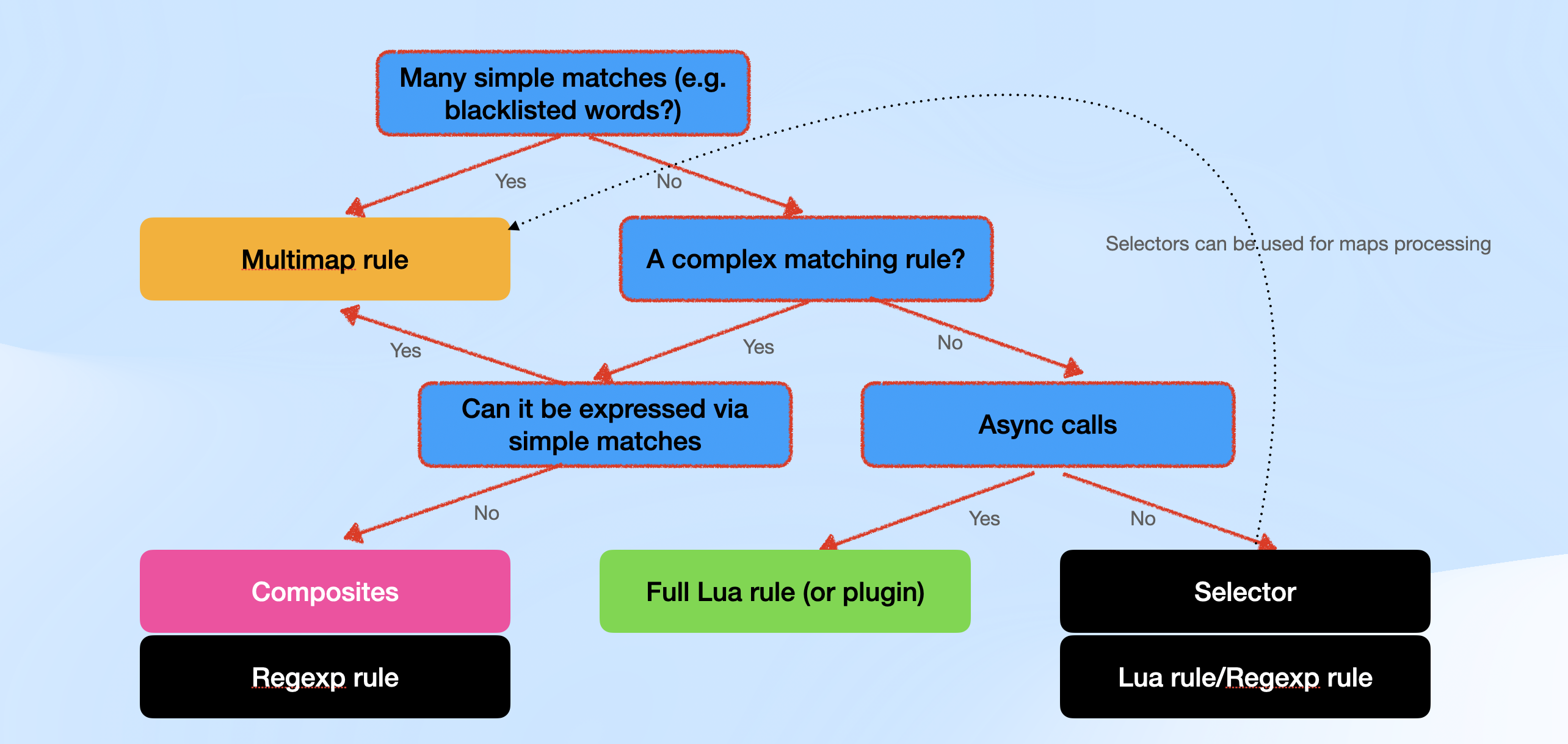Tool Selection Guide
This guide helps you choose the right Rspamd tools and approaches for your specific situation. Rather than overwhelming you with options, we'll guide you through a simple decision process.

Rule Selection Priority
Use the simplest tool that solves the problem. Prefer this order:
- Prefer regexp rules (with conditions)
- If multiple independent matches are required, prefer multimaps
- If you need asynchronous calls, create custom Lua rules
- If you need configuration and multi-symbol logic, write a plugin
- Combine different symbols using composites
1) Prefer regexp rules (with conditions)
Best starting point for: single-pattern detections, cheap text checks, header/body conditions.
- Fast and efficient
- Can be gated with
re_conditionsto validate matches precisely - Keep logic minimal; offload heavy checks to later stages
Example with conditions (inspired by rules/bitcoin.lua):
config.regexp['BITCOIN_ADDR'] = {
re = string.format('(%s) + (%s) > 0', normal_wallet_re, btc_bleach_re),
expression_flags = { 'noopt' },
re_conditions = {
[normal_wallet_re] = function(task, txt, s, e)
local word = lua_util.str_trim(txt:sub(s + 1, e))
local valid = is_traditional_btc_address(word)
if valid then
task:insert_result('BITCOIN_ADDR', 1.0, word)
return true
end
return false
end,
[btc_bleach_re] = function(task, txt, s, e)
local word = tostring(lua_util.str_trim(txt:sub(s + 1, e)))
local valid = is_segwit_bech32_address(task, word)
if valid then
task:insert_result('BITCOIN_ADDR', 1.0, word)
return true
end
return false
end,
},
}
Tips:
- Keep regexps strict and bounded to avoid overmatching
- Use
re_conditionsto confirm complex formats (checksums, structure)
2) If multiple matches are required, prefer multimaps
Use when you need many independent lookups: domains, IPs, keywords, MIME types, URLs, etc.
Benefits:
- Clean separation of data (maps) and logic
- Efficient, built-in caching, easy to maintain lists
Example:
# /etc/rspamd/local.d/multimap.conf
# Block specific senders/domains
BLOCKED_SENDERS {
type = "from";
map = "/etc/rspamd/maps/blocked_domains.list";
score = 8.0;
}
# Flag messages containing risky keywords
RISKY_KEYWORDS {
type = "content";
map = "/etc/rspamd/maps/risky_keywords.list";
score = 3.0;
}
When to choose: many patterns, externalized and frequently updated.
3) If you need async calls — create custom Lua rules
Use when you must perform asynchronous checks: HTTP queries, DNS, Redis/ClickHouse, external services.
Example skeleton:
local rspamd_http = require "rspamd_http"
rspamd_config:register_symbol({
name = 'MY_ASYNC_CHECK',
callback = function(task)
local url = 'https://example.com/check?id=' .. task:get_message_id()
rspamd_http.request({
url = url,
task = task,
timeout = 1.5,
callback = function(err, code, body)
if not err and code == 200 and body == 'bad' then
task:insert_result('MY_ASYNC_CHECK', 1.0)
end
end,
})
return false
end,
flags = 'empty',
})
Notes:
- Return quickly; set results in the async callback
- Respect timeouts; avoid blocking work
4) If you need configuration and multi-symbol logic — write a plugin
Use a plugin when you need:
- Multiple symbols working together
- Structured configuration under
local.d/<plugin>.conf - Reuse across deployments
Minimal plugin shape:
local lua_util = require "lua_util"
local M = 'my_plugin'
local function check_one(task)
-- lightweight logic here
if task:get_header('X-Flag') == 'on' then
task:insert_result('MY_PLUGIN_SYMBOL', 1.0)
end
end
rspamd_config:register_symbol({
name = 'MY_PLUGIN_SYMBOL',
callback = check_one,
score = 0.0,
group = 'policies',
})
return {
name = M,
}
Configuration example:
# /etc/rspamd/local.d/my_plugin.conf
enabled = true;
threshold = 5;
5) Combine different symbols using composites
Use composites to express higher-level logic without duplicating work.
Example:
# /etc/rspamd/local.d/composites.conf
SUSPICIOUS_OUTBOUND {
expression = "(MY_ASYNC_CHECK & RISKY_KEYWORDS) | (BLOCKED_SENDERS & /DMARC_.*//)";
score = 6.0;
policy = "leave"; # keep original symbols as well
}
Guidelines:
- Compose existing symbols first; avoid re-implementing logic
- Use composites to define actions/policies at a higher level
Quick Reference
- Prefer regexp rules with
re_conditionsfor single-pattern checks - Use multimaps for many independent lookups
- Write Lua rules for async operations
- Create a plugin for configurable, multi-symbol logic
- Use composites to combine symbols into richer signals